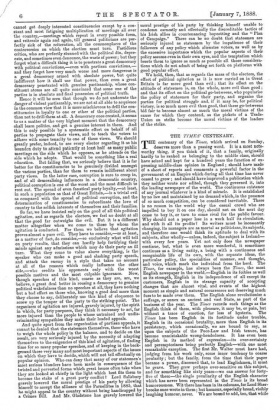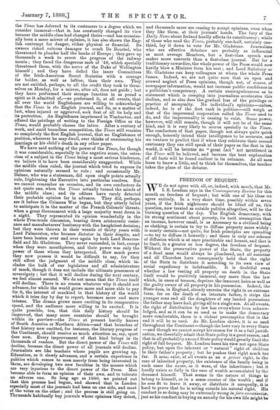THE TIMES' CENTENARY.
THE centenary of the Times, which arrived on Sunday, deserves more than a passing word. It is a most note- worthy thing, if you think of it, that a family, originally hardly to be ranked as belonging to the middle class, should have seized and kept for a hundred years the function of ex- pressing middle-class opinion in England ; should have made of a sheet of reports and comments a powerful factor in the government of an Empire which during all that time has never ceased to grow ; and should have improved a publication which they neither wrote nor edited, though they governed it, into the leading newspaper of the world. The continuous existence of any journal whatever is a kind of miracle. It is established by no law and maintained by no demand which, in the presence of so much competition, can be considered inevitable. There is no reason in the world why the casual crowd who are impelled to buy it on one day, should not on the next day cease to buy it, or turn to some rival for the public favour. Why should not a paper lose in a week half its circulation, and with it all its profits ? Its writers must be incessantly changing, its managers are as mortal as politicians, its subjects, and therefore one would think its aptitude to deal with its subjects, alter wholly—unless, indeed, the subject is Ireland— with every few years. Yet not only does the newspaper continue, but, what is even more wonderful, it sometimes continues as a living entity, a being with a continuous and recognisable life of its own, with the separate ideas, the particular policy, the specialities of manner, and thought, and voice, which mark the individual from the herd. The Times, for example, has always been the Times, the most English newspaper in the world,—English in its foibles as well as its strength, English in its independence of all except its customers, English in its strange capacity of accepting changes that are almost vital, and events of the highest moment as simple and natural occurrences not deserving much fuss to be made over them. The English alone revolutionise a suffrage, or annex an ancient and vast State, as part of the business of the year. The Times records such things as the English think of them, with pleasure, it may be, or pain, but without a trace of emotion, far less of hysteria. The Times has been English in its fortitude under trouble, English in its occasional brutality, more than English in its persistency, which occasionally, we are bound to say, as upon the subjects of the Poor-Law and Irish tenure, has become unmistakable wrong-headedness. It has even been English in its method of expression—its over-certainty and peremptoriness being perfectly English—with one most remarkable exception. The first Mr. Walter must have had, judging from his work only, some inner tendency to coarse jocularity ; but the family, from the time that their paper
became a power, discerned that, to lead Englishmen, it must be grave. They grew perhaps over-sensitive on this subject, and for something like sixty years—we can answer for forty-
five of them—the single peculiarity of the English character which has never been represented in the Times is its broad
humorousness. Wit there has been in its columns, for Load Sher- brooke once wrote in them; but humour, especially broad, visibly laughing humour, never. We are bound to add, too, that while
the Times has deferred to its customers to a degree which we consider immoral—that is, has constantly changed its view because the middle clam had changed theirs—and has occasion- ally been a mere mirror of opinion, it has also shown the Eng- lish contempt for danger, either physical or financial. Its owners risked ruinous damages to crush De Bourbel, who threatened to plunder half the banks of Europe ; they gave up thousands a week to arrest the progress of the railway mania ; they faced the dangerous mob of '48, which specially threatened them, with the nerve of the Duke of Wellington himself ; and they have defied the inner Committees of the Irish-American Secret Societies with a courage far bolder, as well as loftier, than their own. They are not entitled, perhaps, to all the credit they took to them- selves on Monday, for a mirror, after all, does not guide ; but they have performed their strange function in as proud a spirit as it admitted of,—so performed it, at all events, that all over the world Englishmen are willing to acknowledge that the Times is the English journal, and do, as a matter of fact, when injured or aggrieved, seek first of all its help and its protection. An Englishman imprisoned in Timbuctoo, and offered the privilege of writing to the Foreign Office or the Times, would probably choose the latter. After a century of work, and amid boundless competition, the Times still remains so completely the first English journal, that no Englishman of position, wherever he may dwell, ever thinks of announcing his marriage or his child's death in any other paper. We have said nothing of the power of the Times, for though it was considerable, especially in the negative sense, the ostra- cism of a subject in the Times being a most serious hindrance, we believe it to have been considerably exaggerated. While the middle class ruled, the journal which tried to express its opinions naturally seemed to rule ; and occasionally Mr. Delano, who was a statesman, did upon single points actually rule, frightening the Executive into particular resolves. But we cannot remember an occasion, and its own conductors do not quote one, when the Times actually turned the minds of the middle class ; and its editors have rarely detected their probable opinion far in advance. They did, perhaps, see it before the Crimean War began, but they utterly failed to anticipate it in the matter of the French Colonels' threats, when a great Government with a large majority went down in a night. They represented its opinion wonderfully in the whole Free-trade discussion, bearing down aristocratic resist- ance and manufacturers' hesitancy with the haughtiest decision; but they were thrown in their wrestle of thirty years with Lord Palmerston, who became dictator in their despite, and have been beaten over and over again by both Lord Beacons- field and Mr. Gladstone. They never succeeded, in fact, except when they were mouthpieces, and their power was only the power of those whom they interpreted. How much power they now possess it would be difficult to say, for they still affect the judgment of the middle class, which in- cludes the bulk of our legislators and all administrators of mark, though it does not include the ultimate possessors of sovereignty ; but that it will decline dining the next century, we feel almost assured. We do not mean that the Times itself will decline. There is no reason whatever why it should not advance, for while the world grows more and more able to pay for it, the interest of mankind in that history of the world which it tries day by day to report, becomes more and more intense. The drama grows more exciting in its comparative speed, and the audience more willing to be excited. It is quite possible, too, that this daily history should be improved, that many more countries should be brought within its purview—the Times at present hardly knows of South America or Northern Africa—and that branches of that history now omitted, for instance, the literary progress of the Continent, should receive as much attention as, say, sport does now. Every improvement of that kind brings in its thousands of readers. But the direct power of the Times will decline, because the direct power of all journals will decline. Journalists are like teachers whose pupils are growing up. Education, as it slowly advances, and a certain experience in politics which comes to men merely from being interested in them, are developing two new faculties in the masses which are very injurious to the direct power of the Press. Men become able to form an opinion of their own, and to tolerate an adverse one. So long ago as 1880, we pointed out that this process had begun, and showed that in London especially most of the journals had been on one side, and most of the votes on the other ; and the process is still going on. Thousands habitually buy journals whose opinions they detest, and thousands more are ceasing to accept opinions, even when they like them, at their journals' hands. The fury of the Daily News about Ireland hardly affects its constituency ; while of those who read the Times, probably one-half, certainly one- third, lay it down to vote for Mr. Gladstone. Journalists who are effective debaters are probably as influential as most average Members, but a first-class speech now makes more converts than a first-class journal. Bat for a traditionary cowardice, the whole power of the Press would now hardly blow a Minister from his seat ; and Lord Salisbury or Mr. Gladstone can keep colleagues at whom the whole Press fumes. Indeed, we are not quite sure that an open and avowed neglect of Press opinions, though not, of course, of newspaper information, would not increase public confidence in a politician's competency. A certain unscrupulousness as to statement which is creeping into journalism accelerates this decline, and so also does the gradual loss of the privilege or practice of anonymity. No individual's opinions—unless, indeed, he is of the first rank in politics—will weigh as that of the impersonal corporation called the Times used to do, and the impersonality is ceasing to exist. Some power, however, will still remain, though it will not be of the same kind, and it is very likely to accrue specially to the Times. The conductors of that paper, though not always quite quick enough, honestly intend their intelligence to be accurate, and we venture to predict that if when they celebrate their second centenary they can still speak of their paper as the first in the world, it will be because no "great fact" not mentioned in the Times will be believed, and because the best explanation of all facts will be found earliest in its columns. As all men learn to know a little, and to think for themselves, the teacher takes the place of the debater.























































 Previous page
Previous page